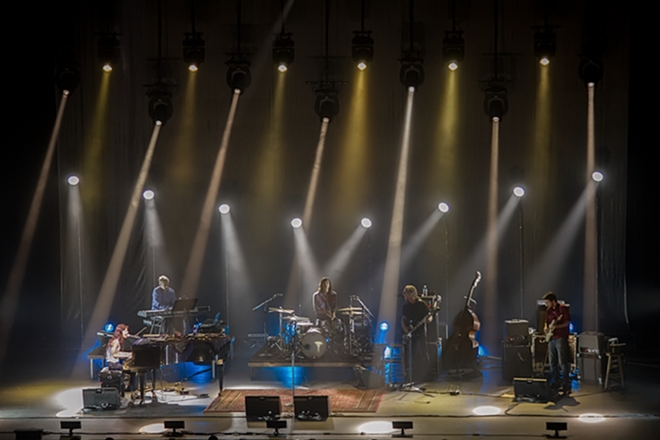I've appreciated Fiona Apple since she released Tidal when I was in middle school. I read her interviews, watched her videos, even grew my hair long so I could pretend to look like her in the "Never Is a Promise" video, but I didn't talk about her. Although she never came off as a pop star, there she was on MTV and the cover of Rolling Stone; she was unquestionably famous. Around the same time, I began listening to Ani Difranco and Bikini Kill. As most people do when they’re younger and first getting into music, I desired that otherness, that coolness that came from listening to music far, far outside of what played on the radio. I liked Fiona Apple, but kept it on the sly, so much so that when, all these years later, I asked my boyfriend if he would come with me to see her at Ruth Eckerd Hall on Saturday night, he was shocked and replied, "I’ve never heard you play her."[Text by Shae, photos by Tracy.]
If you had asked me if I were a fan — that is, a fanatic — up until the show, I would have said that I liked her music well enough but wasn’t a fan, no. My answer has since changed, and I can pinpoint the exact moment of my conversion.
It was after seeing the prices posted at the merch table and making the comment that the $60 "cheap seats" and $30 tee-shirts were Bob Dylan prices, and Fiona Apple was no Dylan.
It was after Fiona’s touring guitarist Blake Mills opened the evening, first playing solo and switching to a new guitar for each song, Fiona’s band joining him one by one as the set progressed: the bassist on upright, the drummer, the keyboardist. Mills' skill is his guitar-work, not his songwriting, and his compositions were slow and lacked anything catchy enough to make the audience stop talking or leaving to get more beer. The most memorable part was, as my boyfriend described them, those "WTF?" moments in his lyrics. In one song, Mills sang about someone being "tighter than a duck’s asshole on a water-slide." WTF? is right.
It was also after Fiona bounded onstage in an over-sized hooded sweatshirt, took the microphone from its stand and sat cross-legged near the front of the stage as she addressed an absent Perez Hilton. She admonished him to stop hurting people’s feelings and chastised him for saying she looked like she was a grandma just because she hadn't gotten a facelift in the past seven years. Finally, she spoke to us, the audience; she gave us a lecture on how we have choices on how to handle bad situations. And while this open-veined scene of radical vulnerability made my post-postmodern feminist heart flutter, I could have walked away, unaffected.
But when the stage exploded in white, pulsing light and the first song "Fast As You Can" kicked off with its jeering riff and Fiona singing in her throaty vibrato, "I let the beast in too soon, I didn’t know how to live without my hand on his throat," and my chest tightened, my heart raced and tears welled up in my eyes — it was that moment I realized with disrobed clarity just how much her music meant to me.
For the next hour-and-a-half, Fiona yowled, cooed, pounded and stomped her way through songs from her four LPs. She moved back and forth between sitting at her piano with her feet dangling from the bench and standing (and twisting, hopping, and balancing on one foot) at the microphone stand planted center stage. Though Fiona is tiny, her voice is gigantic, and her control of it is nothing short of miraculous. One moment of trilling in an operatic soprano tore into an unleashed bellow with little forewarning. Loud/soft, high/low, playful/serious, vulnerable/strong — these dichotomies were not lost on Fiona. At the end of a song, after pounding on a floor tom with abandon, she growled, "And stop calling me frail, I'll beat the hell out of you!" While she did look like a fragile and precocious child on stage, constantly hiking up her baggy skinny jeans, I believed her threat. If push came to shove, I have no doubt that Fiona, going for the jugular, would be the victor.
During the penultimate"Not About Love," she displayed her most impressive vocal feat of the night. On Extraordinary Machine, it's a jaunty song with hints of bitterness and remorse; live, it became an unbridled, spite-filled denunciation. Between refrains the band paused and worked those aforementioned dichotomies, playfully holding out their silence longer each time, with the drummer teasing her signal for the song to recommence. And when it did, Fiona spewed lava, her fiery hostility so powerful, so palpable, that my own throat hurt.
The show ended abruptly, with no encore, after a slow, haunting rendition of Conway Twitty's "It's Only Make Believe." The crowd rose to our feet in awe and adoration, begging Fiona to return for one more song but the houselights flooded the hall and the crew appeared on stage to dissemble the drums and roll up wires. As we streamed out into the night, we — including those of us who had only listened in secret or who, like my boyfriend, had never listened at all — were all, undoubtedly, fans of Fiona Apple.


